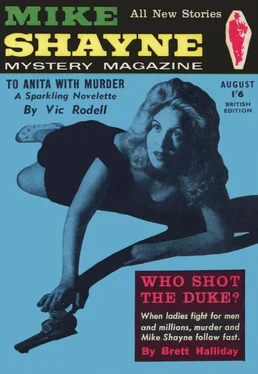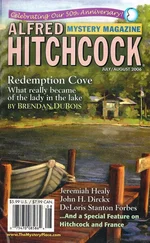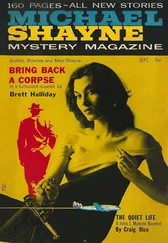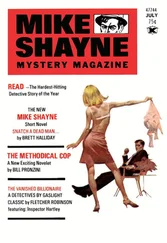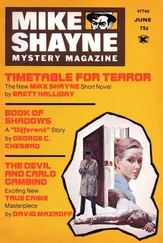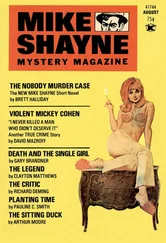Jay Carroll - Mike Shayne Mystery Magazine, Vol. 1, No. 4, August 1957 (British Edition)
Здесь есть возможность читать онлайн «Jay Carroll - Mike Shayne Mystery Magazine, Vol. 1, No. 4, August 1957 (British Edition)» весь текст электронной книги совершенно бесплатно (целиком полную версию без сокращений). В некоторых случаях можно слушать аудио, скачать через торрент в формате fb2 и присутствует краткое содержание. Город: Sydney (London), Год выпуска: 1957, Издательство: Frew Publications (distributed by Atlas Publishing & Distributing), Жанр: Детектив, на английском языке. Описание произведения, (предисловие) а так же отзывы посетителей доступны на портале библиотеки ЛибКат.
- Название:Mike Shayne Mystery Magazine, Vol. 1, No. 4, August 1957 (British Edition)
- Автор:
- Издательство:Frew Publications (distributed by Atlas Publishing & Distributing)
- Жанр:
- Год:1957
- Город:Sydney (London)
- ISBN:нет данных
- Рейтинг книги:3 / 5. Голосов: 1
-
Избранное:Добавить в избранное
- Отзывы:
-
Ваша оценка:
- 60
- 1
- 2
- 3
- 4
- 5
Mike Shayne Mystery Magazine, Vol. 1, No. 4, August 1957 (British Edition): краткое содержание, описание и аннотация
Предлагаем к чтению аннотацию, описание, краткое содержание или предисловие (зависит от того, что написал сам автор книги «Mike Shayne Mystery Magazine, Vol. 1, No. 4, August 1957 (British Edition)»). Если вы не нашли необходимую информацию о книге — напишите в комментариях, мы постараемся отыскать её.
Mike Shayne Mystery Magazine, Vol. 1, No. 4, August 1957 (British Edition) — читать онлайн бесплатно полную книгу (весь текст) целиком
Ниже представлен текст книги, разбитый по страницам. Система сохранения места последней прочитанной страницы, позволяет с удобством читать онлайн бесплатно книгу «Mike Shayne Mystery Magazine, Vol. 1, No. 4, August 1957 (British Edition)», без необходимости каждый раз заново искать на чём Вы остановились. Поставьте закладку, и сможете в любой момент перейти на страницу, на которой закончили чтение.
Интервал:
Закладка:
How quickly all that had changed, when they were still young men and the Old Man died. After he came from Poland to America, the Old Man had worked twenty years to build the coaster, and it had been his one wish that his sons would run it after he was gone. But Julius, the older, had taken control from the start, squeezed his brother out and sold the coaster for a song to open his first Spin-A-Line game.
Hranek ran his fingers over his face, rubbing the thickened tissue at the corner of his mouth, and he felt the hatred rise again. He slammed the last ball into the foul zone, looked over the floor, saw it was deserted and walked straight to the photo booth.
Inside, he drew the canvas curtain shut and studied the booth wall where it was flush against the wall of the Spin-A-Line building. It took him half a minute to find the shallow finger-slot on the narrow sliding door. Then he removed the revolver from his trouser pocket and placed it in his coat pocket, where it would be more accessible.
The door slid back easily, revealing an opening in the wall nearly as high as a man was tall. Beside it was an ordinary elevator panel with a single button. He did not hesitate. He pressed the button, saw the steel cables move and heard an electric motor whir.
In a moment, the elevator stopped beside the opening in the wall. He unlatched the narrow elevator door, passed through it in a crouch and, from inside the elevator, closed the door behind him.
He pushed the No. 4, top floor button and placed his hand on the revolver in his coat pocket. The steel was hard and cold.
At the top floor the elevator came silently to a halt. Hranek stepped out into a hallway. It was panelled handsomely in oak, and the wall-to-wall rug was thick and spongy under his shoes as he walked along to the broad door on which, in conservatively small letters, were the words Julius L. Hranek, President.
Drawing the revolver from his pocket, he turned the heavy brass knob and then, with his shoe, nudged the door open.
The first things he saw were Julius’ feet up on the glass top of the desk, wearing the highly polished black cowboy boots he affected, to give himself extra height, boots with high sharp heels that could leave ridges and dents in a man’s face.
Julius’ great sloth-like body was supported by a swivel chair. His pink plump hand, holding a thin cigar, paused in mid air as he saw his brother.
Hranek glanced once around the office and saw the small gunman reclining on the leather couch behind Julius.
“Don’t move!” Hranek said. “Either of you.”
There was no expression in Julius’ pale blue eyes. “Now, Sam,” he said gently, “don’t be — hasty.”
“I told you it would come to this,” Hranek said through his teeth. “I told you the day I quit you to work in the shipyard. And I’m—”
The hand of the gunman moved fast, astonishingly fast, firing from beneath his coat. Death sang past Hranek’s shoulder and passed through the wall.
Hranek fired two bullets almost simultaneously, the new trigger of the revolver working stiffly, and saw them strike home in the gunman’s chest.
An expression of intense surprise came over the gunman’s face. Staring at Hranek’s revolver as if he didn’t understand why it had damaged him that way, he raised himself up on his elbows. Then his arms collapsed, and he fell forward, sliding off the leather couch to the floor, where he lay without moving.
Julius swivelled slowly around in his chair and looked at the fallen man. When he turned back to Hranek, the fat man’s forehead and round cheeks glistened with pinpoints of sudden perspiration.
“My gosh!” Julius murmured, unbelieving.
“Start praying,” Hranek said, “because where you’re going, you’ll need all the help you can get. You’re going to...”
Hranek heard something in the hall, the metallic click of the elevator doors closing. Still in the doorway, he pivoted and glanced down the hall in time to see the approach of the other gunman, the faded blond one who had been stationed downstairs. The blond man threw himself on the floor like an advancing soldier, and they fired together.
Hranek’s first bullet was high and instantly a long straight streak appeared in the green rug beyond the blond man. Hranek’s second bullet caught the man in the forehead, an inch below his blond widow’s peak. The man’s head tipped forward as if he were nodding, then he turned his cheek, cradling it against the rug, and became silent.
Hranek stepped back into the office. He strode around the desk, kicked the swivel chair, and it rolled away from the desk on its small wheels, carying Julius with it.
“Please, Sam!” Julius cried. “I’ll give you money, lots of money!”
“You’ll give me nothing!” Hranek said. Then he paused, remembering what Racine had asked for. “Except one thing. Where is it, Julius — the record you keep of your payments to the councilmen?”
“Of course, of course!” Julius got up from the chair and stood there, his fat body rocking on the high heels of the polished boots. “We’ll be partners again, Sam, won’t we — like we were before?”
“You’re all through.” Hranek said. “Where is it?”
“Sure, Sam.” Julius reached inside his coat and brought out a yellow leather wallet. From it his trembling fingers extracted a small address book, which he handed to Hranek.
“There it is, Sam. It’s all in there, everything!”
Hranek fanned through the pages, saw the councilmen’s names, the dates and the amounts paid.
“All right,” he said. “Now look at me, Julius.”
Their eyes locked and Hranek, seeing the smooth, unmarred skin on his brother’s fat face, felt the hatred bigger than ever, strong and overpowering.
“Look at it,” he said. “Look at this mess I carry for a face and remember how you did it, how you stood over me and smashed me with your boots!”
Julius backed away, his eyes fixed on Hranek, his great mass of chins quivering.
“I’m going to smash your face.” Hranek said.
“When your face is numb — then I’m going to kill you!”
“No!” Julius said.
Hranek hit him hard on the cheek with the revolver, and Julius went down. Julius lay on his back, stiff with fear, a red stream emerging from the wound on his cheek.
Hranek leaned over him, raising the revolver to strike again.
He looked at the blood, and, abruptly, he remembered again the baseball games they had played on the beach, back in those years when everything had been all right between them. He remembered the day he had been struck by the ball, struck on the cheek. Julius had wiped the blood away and then run for their father.
He remembered other times — the morning he had managed to grab Julius’ swim trunks and drag him to safety in the surf by the pier — and the day they had fought back to back against the attacking West Side kids.
He couldn’t do it.
He raised the revolver and tried to strike again, but he could not force himself to do it. Gone was the hatred, replaced by a sickness deep inside, which protested the evil thing their lives had become when they grew up.
Hranek lowered the revolver and turned away from Julius. Weak, nauseated with himself, he sat down heavily in the swivel chair and looked at the floor.
He heard the elevator doors slam, heard someone running down the hall, but he did not look up until Nina came into the office.
“Sam!” She ran to his side.
“Couldn’t do it.” He shook his head. “I couldn’t do it!”
He watched Julius get slowly to his feet but he didn’t realise what was happening until Julius snatched the incriminating address book from his fingers and went out the door. Despite his weight and the awkward western heels, Julius moved very fast down the hall.
Читать дальшеИнтервал:
Закладка:
Похожие книги на «Mike Shayne Mystery Magazine, Vol. 1, No. 4, August 1957 (British Edition)»
Представляем Вашему вниманию похожие книги на «Mike Shayne Mystery Magazine, Vol. 1, No. 4, August 1957 (British Edition)» списком для выбора. Мы отобрали схожую по названию и смыслу литературу в надежде предоставить читателям больше вариантов отыскать новые, интересные, ещё непрочитанные произведения.
Обсуждение, отзывы о книге «Mike Shayne Mystery Magazine, Vol. 1, No. 4, August 1957 (British Edition)» и просто собственные мнения читателей. Оставьте ваши комментарии, напишите, что Вы думаете о произведении, его смысле или главных героях. Укажите что конкретно понравилось, а что нет, и почему Вы так считаете.
